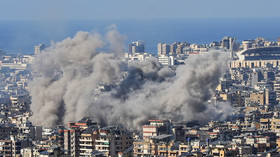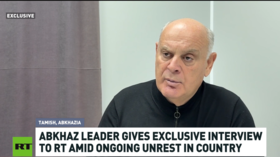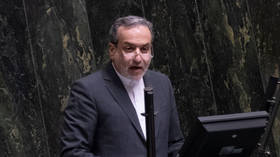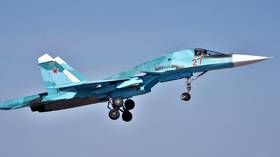‘Iraqi soldiers not willing to die for US’
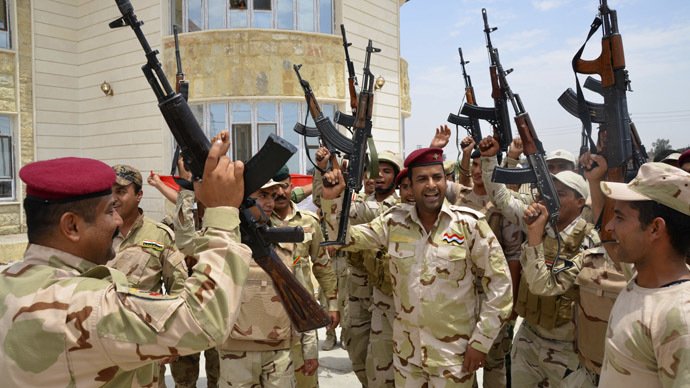
Many Iraqi army soldiers consider that it is not worth dying for the US-controlled puppet Baghdad government as they understand that it will come down to the obliteration of Iraq as a state, geopolitical analyst Patrick Henningsen told RT.
RT:Many soldiers have deserted the Iraqi army, why did they do that?
Patrick Henningsen: As many people reported, there are a lot of reasons why the Iraqi army has been so unsuccessful despite the fact that the numbers are upwards of 250,000 compared to between 20,000 and 30,000-strong with ISIS. Morale has been very low, and also organization is very poor with the Iraqi army. In a nutshell the Iraqi armed forces are a complete mess. But as a reflection of the country itself, which is also a complete mess, and then it should come as no surprise. The other problem with morale within the Iraqi army is that many people serving in the Iraqi armed forces consider it maybe that it is not worth dying for the US-controlled puppet government in Baghdad. And unfortunately, despite the rhetoric we have in the US and in the glad-handing in NATO countries and in Britain, most Iraqis view the government in Baghdad as a US-controlled puppet government. What soldier in a right mind would think that that was worth dying for? We expect them to have a lot of national pride but at the end of the day it really comes down to the obliteration of the nation state of Iraq.
RT:Why is the Iraqi government now re-enlisting these deserters to fight Islamic State?
PH: Currently the Iraqi government is trying to claw back some of the soldiers that it has lost, people that have either left their post or have been classed as deserters, or quite simply were fed up on the field and just walked away. Only last week in Ramadi, this is an Anbar province, 150 soldiers walked off their post because they ran out of ammunition. And this should give you an indication of how poorly organized the Iraqi army is. This is a pyramid top down 250,000-strong armed forces but very inefficient. And of course this was put in place by the United States. I think that Iraq was by design left weak by the US. They have left the Iraqi armed forces weak as well by design because that means they will need their help later. Despite what people like General [Martin] Dempsey will say or what people say “the genius of General Petraeus,” the US has left the country of Iraq in a very weak position militarily, and politically, and everything else.
RT:Is there any guarantee that the re-enlisted deserters will not desert again?
PH: No, there is no guarantee that amnestied deserters will not walk off the post again. In fact, the odds are that they will, because the infrastructural changes that would need to be made are huge with the Iraqi armed forces. We are only talking really about maybe 5,000, to 15,000 of these types of deserters that they could re-recruit. But there are huge logistical problems: travel around Northern and Western Iraq is very very difficult. In some cases people that want to reenlist or people that want to rejoin because they need money or because they feel it is the right thing to do, they can’t even make it to the recruitment centers because of all these check points and some people are taking 4 or 5 days to make a journey that will not normally be made in a day. Also, I have to point out that one of the other reasons why the armed forces of Iraq are so weak is because you have a sectarian problem. The armed forces - like the country - are divided along sectarian lines. The US is going to great pains in 10 years or 15 years of invasion, occupation to dismantle any of the Shia militia in the country that they could have been working with to basically flesh out ISIS. ISIS wouldn`t last a week in some of these areas of Iraq had there been a significant Shia militia presence as that might have been a few years ago, but that is because the US is going out their way to want to dismantle any militias, disarm the Iraqi population so that they would need to rely on a giant pyramid top down Baghdad-controlled armed forces that is proven to be very ineffective.
RT:The US has supplied substantial military aid to the Iraqi army. So why is it so incapable of fighting Islamic State?
PH: One of the main problems in Iraq is corruption. These are habits that were formed during the US invasion, occupation. Cash is very short with some people in a lot of communities. A lot of money’s gone missing; equipment hasn’t made it to its destination. Under-equipped, under-armed, lack of ammunition - these all are normal things if you speak to any Iraqi army or security services personnel. Around the ring of steel around Baghdad is much more secure, much more dependable. Where the problems really exist is out in the extremities in the North and the West, is where they need it most, where the organization, the equipment needs to be top notch and it simply is not. No matter how much money you throw out at it unless you address the fundamental problems, which the US cannot do and which the current US controlled government in Baghdad is unable to do. Unless you address these fundamental problems then there is going to be no amount of money or resources you can throw to make this military a 21st century fighting force.
The statements, views and opinions expressed in this column are solely those of the author and do not necessarily represent those of RT.
The statements, views and opinions expressed in this column are solely those of the author and do not necessarily represent those of RT.




